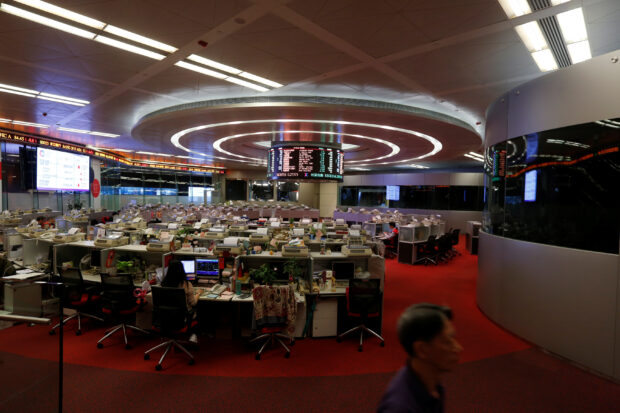
A floor trader walks during afternoon trading at the Hong Kong Stock Exchange in Hong Kong, China. REUTERS/Bobby Yip/File photo
HONG KONG – Global stocks rose and the dollar softened on Tuesday, as a deal backed by the U.S. regulator for First Citizens BancShares to buy failed Silicon Valley Bank soothed wider worries about problems in the sector.
MSCI’s broadest index of Asia-Pacific shares outside Japan edged up 0.6 percent by early afternoon Hong Kong time. U.S. stock futures, the S&P 500 e-minis, rose 0.1 percent.
Australian shares jumped around 1 percent, as lithium and commodity stocks rallied sharply after battery metals explorer Liontown Resources rejected a $3.7-billion buyout bid from Albemarle Corp.
Lithium miner Liontown soars as it snubs $3.7-B Albemarle bid
Top U.S. banking regulators said on Monday they planned to tell Congress that the overall financial system remains on solid footing after recent bank failures, but will comprehensively review their policies in a bid to prevent future collapses.
As fears eased, so did demand for the safest assets with the U.S. dollar index – which gauges the currency against six peers – off 0.14 percent to 102.6 during Asian trading, extending Monday’s 0.35 percent drop.
Safe-haven dollar slips as bank fears ease; yen, Aussie soar
Asian currencies broadly firmed, with the Malaysian ringgit hitting a five-week high.
The concerns, however, haven’t completely gone away as Federal Reserve Governor Philip Jefferson said on Monday that stress among small banks could hit small businesses hardest.
“This round of uncertainty that we’re seeing, it will likely continue for some more time,” said Manishi Raychaudhuri, Asia-Pacific head of equity research at BNP Paribas. “We haven’t seen the end of it.” He expects continued volatility for global markets going forward for at least one or two quarters.
In addition to concerns about any contagion caused by developed market banking woes, markets have also been jostled by wild shifts in expectations about what central banks in the United States and Europe might do next, Raychaudhuri said.
“On one day, the market expects maybe a 25 basis points or maybe a 50 basis points rate hike. Just in a matter of one or two days, that outlook is changed to 50 basis points rate cuts in the second half of the year,” he said.
In China, the benchmark was almost flat, while the Hong Kong benchmark added 0.5 percent, as the re-emergence of Alibaba founder Jack Ma on Monday helped to quell some concerns of its private sector after a bruising two-year regulatory crackdown.
“Ma’s return to business would be a strongly positive sign for China’s tech industry,” said Brock Silvers, chief investment officer at private equity firm Kaiyuan Capital.
“But the reason behind Ma’s reappearance isn’t yet clear… Market watchers will quickly deduce whether Ma’s visit was a one-off event or perhaps something more,” he said.
In early European trade, the pan-region Euro Stoxx 50 futures rose 0.32 percent and German DAX futures and FTSE futures both added around 0.3 percent.
On Monday, the S&P 500 ended slightly higher as a deal for Silicon Valley Bank’s assets helped to boost bank shares, while technology-related stocks dipped amid profit taking after a strong quarter.
SVB deal helps to steady banks amid credit crunch concerns
U.S. Treasury notes nursed some losses by Monday early afternoon. Yields rose overnight on optimism that stress in the banking sector could be contained and as the Treasury Department saw soft demand for a sale of two-year notes.
Benchmark 10-year yields slipped to 3.5129 percent, down from its U.S. close of 3.528 percent on Monday.
Two-year yields slipped to 3.9324 percent. They are higher than the six-month low of 3.555% hit on Friday but well below the almost 16-year high of 5.084 percent hit on March 8.
By Tuesday afternoon, oil prices softened with U.S. crude dipping 0.08 percent to $72.75 a barrel. Brent crude fell to $77.79 per barrel.
Overnight, oil prices rose more than $3 on Monday as a halt to some exports from Iraq’s Kurdistan region added to worries about oil supplies while a U.S. banking acquisition eased worries that financial turmoil could hurt the economy and curtail fuel demand.
Gold was slightly higher. Spot gold was traded at $1,958.13 per ounce.